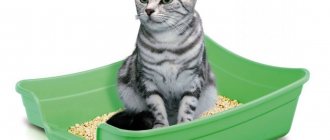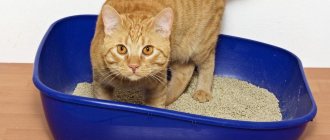Causes of aggressive behavior in cats
When a pet begins to hiss and growl at the sight of a kitten and tries to drive the baby under the sofa, you should not yell at her or punish her, because this will only aggravate the problem and in the future it will be very difficult to make friends with animals. The owner must understand that this behavior of the cat is quite natural and in this way it shows its dissatisfaction and resentment.
© shutterstock
If a cat has been the only pet in the apartment for several years, then it is natural that it perceives its home as its sole possession and does not want to share the territory with anyone, be it a dog or another cat.
We should not forget that cats are very jealous creatures, so the appearance of another animal is considered a betrayal on the part of the owner and will try to get rid of the rival in any way. This aggressive behavior is especially typical for cats that came into the house from the street or from a shelter. Animals are afraid that they will again find themselves unwanted and abandoned, and this is the reason for their hostility towards the stranger.
In addition, owners often make the common mistake of paying all their attention to a small kitten, forgetting that it is at such a moment that the cat needs the love and care of the owner .
And it will be much simpler and easier to establish friendship between a cat and a kitten if you show the adult pet that with the birth of the baby, the attitude towards her will remain the same, so that she does not feel deprived of the owner’s attention and affection.
Why does a cat growl at someone else's kitten?
We have already figured out that an adult cat often growls at her own kittens. I wonder what happens when the kittens are strangers? It would seem that they need to share? Let's look at a number of factors for this manifestation:
- The cat growls at a strange kitten that appears nearby, thereby demonstrating that she is the main one in the house. At the same time, an adult cat is able to express its hostility to a newcomer not necessarily by growling and hissing; it is easily ready to paw at the face or bite.
- It is not uncommon for pets to immediately greet a young pet rather indifferently, literally ignoring him. However, as soon as the newcomer begins to approach the cat’s personal belongings (bed, bowl, toys, etc.), the animal becomes furious. And here teeth and claws, growls and hisses come into play. This method helps explain to the cat that it is better not to touch its belongings. It immediately becomes clear who is boss in the house.
- It must be said that a cat is a touchy and rather vulnerable creature. She does not accept that the owner brought a stranger into the home. In such a situation, the growling may be aimed not at the new kitten, but at showing others one’s own resentment.
How to reconcile two pets: first steps
For a cat, the appearance of a second pet in the house is stressful, and making them friends is realistic only when the animals have enough time to get to know each other. And in order to help the pet quickly adapt to this situation and get used to the idea that the little kitten is now a full member of the family, the owner must provide the most comfortable conditions for both pets to live together.
- You shouldn’t force things and pit your pet against a new resident as soon as he appears in the house. First you need to check what your cat's reaction to the kitten will be and if she does not show aggression, you can give them the opportunity to get to know each other better;
- You should not leave animals in the same room unattended, hoping in this way to bring them closer and make friends, since the behavior of an adult pet is difficult to predict. He can take advantage of the owner's absence and attack the kitten, causing him serious harm;
- It is unlikely that you will be able to make friends with pets if your baby steals food from the cat’s plate. Therefore, in the first days it is better to feed the kitten separately and not allow it to the bowl of an adult pet;
- Cats are very jealous of their litter box and may refuse to go into it if the kitten leaves traces of its presence there. Therefore, a small pet should have its own tray to correct its natural needs;
- To prevent the baby from taking over the cat’s favorite house or its bedding, he should be given a separate place to rest;
- You can make friends between a cat and a new kitten by playing together. When playing with your baby, include an adult pet in the game, this will bring them closer and give them the opportunity to get to know each other better;
- You should not allow the baby to do things that are forbidden to the first pet, for example, sleep on the table or eat from the owner’s plate, because this will cause an additional portion of jealousy on the part of the old-timer;
- If a cat asks to be held and requires attention and affection, do not refuse it, because she wants to make sure once again that her owner still loves and appreciates her.
© shutterstock
Ways to reconcile pets
The reaction of a cat and a female cat to the appearance of a small foreign kitten in the house is often different. A cat shows aggression for one reason; for a cat, these motives may differ.
How to accustom a kitten to your hands: reasons for fear and methods of training
But their hostility is united by one fact - they are inveterate loners and they extremely dislike unwanted neighbors. The owner of animals should remember that different causes of aggression require different ways to solve them. Let's take a closer look at how to reconcile a kitten with a cat and a male cat.
Friendship between cat and kitten
It is somewhat easier to make friends with a kitten than a mature cat.
Many owners believe that when a cat meets a baby, its maternal instinct can awaken. Sometimes this happens. The animal accepts the new family member as its own child, but this rule can only work if the cat is currently nursing, or has recently lost its kittens.
In a fit of longing for her babies, she perceives someone else's kitten as her own. Although such cases are possible with non-lactating females. But most often the brought baby is perceived as an adult animal that poses a threat to her life and it will not be possible to reconcile them at first.
Attention! To reconcile them, the kitten should be shown to the cat gradually.
First, they should be isolated from each other. Let her get used to his smell. Then try to introduce them. The cat will sniff it carefully and consider whether it is dangerous to its life.
Playing together, not punishing aggression, separating bowls and trays will do the trick - after a while the cat will accept the kitten, if not as her baby, but as a safe friend.
A mature cat may show inappropriate sexual attraction to a kitten. This occurs due to the smell emitted by the baby, a hormonal surge due to unsatisfied sexual needs. In such a situation, the animal should be sterilized.
When a cat meets a kitten, its maternal instinct may awaken
Why don't some cats accept kittens?
There are a number of reasons why a female mother ignores her newborns. They may be behavioral, caused in part by hormonal imbalances. Sometimes a cat will not accept kittens due to a medical condition that makes her unwilling or unable to care for her children.
Behavioral problems
Some mother cats believe that the first kitten born is the only one. They focus on him and ignore others. Sometimes a female rejects a litter born by Caesarean section, as well as due to undeveloped maternal instinct.
Animals can abandon their young due to stress caused by obsessive attention from their owners, bright light, noise, poor living conditions, and malnutrition. A difficult birth can frighten a mother so much that she refuses to care for her offspring (avoids the source of pain).
Alien smell can cause kittens to be abandoned. Do not touch them with your hands without medical gloves. You can correct the situation by “marking” the cubs with their native smell (cat milk, urine). As a last resort, apply your pet’s favorite treat to the “refuser”.
Cats will not accept kittens that seem sick or unviable to them.
Sometimes the female instinctively abandons and stops feeding a weak cub (especially in a litter that is too large) - one with a birth defect, illness, or parasites. In the wild, this is a normal occurrence to conserve limited resources and prevent the spread of disease in the litter.
Diseases and hormonal disorders affecting maternal behavior
Any disturbance in the endocrine or nervous system - a decrease in the levels of prolactin, oxytocin, serotonin, dopamine - affects the instincts, prompting the female to ignore her children.
A cat will not accept kittens if she does not produce milk. This problem may occur due to a defect in the pituitary gland: low levels of the hormone prolactin lead to insufficient development of the mammary glands during pregnancy.
Another reason for lack of milk is malnutrition. A pregnant female should eat 2-2.5 times more calories per day than a normal female. If the amount of food and water is insufficient, weight loss and dehydration will reduce lactation.
Sometimes the breasts can become inflamed due to infection, a condition called mastitis. Swelling and pain occur in the affected glands. The milk becomes yellow, thick and occasionally bloody. The female's temperature rises, she becomes lethargic and loses her appetite.
Often, a cat refuses to feed due to painful hardening of the mammary glands due to eclampsia (low calcium levels), stagnation of milk, postpartum diseases of the uterus, peritonitis. When an animal is in pain or unwell, it has no desire to care for its offspring.
What to do when your cat won't accept kittens
If your pet is a first-time mother and refuses to nurse newborns, apply them to her nipples. Sucking will release hormones, which will improve her mothering behavior. If the cat is physically healthy, you can try to gently “persuade” her to care for the babies.
Place the mother and her kittens in a quiet, private area of the house. Try not to disturb the cat family often, place food, water and a litter box nearby so that the cat can reach them without leaving her newborns for a long time.
Observe the animal's temperature and condition, and check the mammary glands for lumps, milk, or abnormal vaginal discharge indicating an infection in the uterus.
Examine kittens for any signs of disease or birth defects. If you find weak individuals or your cat is behaving inappropriately, take them to the vet. Try to find another lactating female for the “refusers” or start feeding them using special mixtures.
Ask your veterinarian how to care for newborns and how much and how often to feed them. These parameters change as they get older, so it is best to work closely with your veterinarian during this critical period.
Nursing cat, her own and other people's kittens
Usually, it is not difficult to place orphaned kittens “to stay” with a nursing cat. For the “adoption” to be successful, it is recommended to simply place one or two adopted children near the nursing mother’s house. Their plaintive cries will attract the attention of the cat, which will independently find them, carry them to itself and care for them, after which they will become full-fledged members of the family. There is another way: to “impregnate” other people’s kittens with the smell of a cat’s nest by wrapping them in bedding from the house. And then, in the absence of the mother cat, place it between her own kittens. Upon returning, the cat may not even notice that the number of kittens has increased. By the way, the younger the kittens are, the easier it is to provide them with contact with their foster mother.
The cat peed on... - he is jealous of...
When a pet pees on any object or in a certain place, thoughts immediately appear that the pussy is doing this out of anger or jealousy.
Did the cat pee on my boyfriend's shoes? She's jealous of him! Did the cat pee in the baby's crib? This is jealousy! Did kitty do business in my bed? She is jealous of the new cat who sleeps there.
You will be disappointed, but this is not how cats show their jealousy.
A cat may pee outside the litter box for various reasons, but “punishing” a person is not one of them. In many cases, this is due to illness or stress, but often the problem is difficult to diagnose without a visit to the veterinarian. Another explanation for this behavior may be the inconvenient location of the tray. Tags children dog











